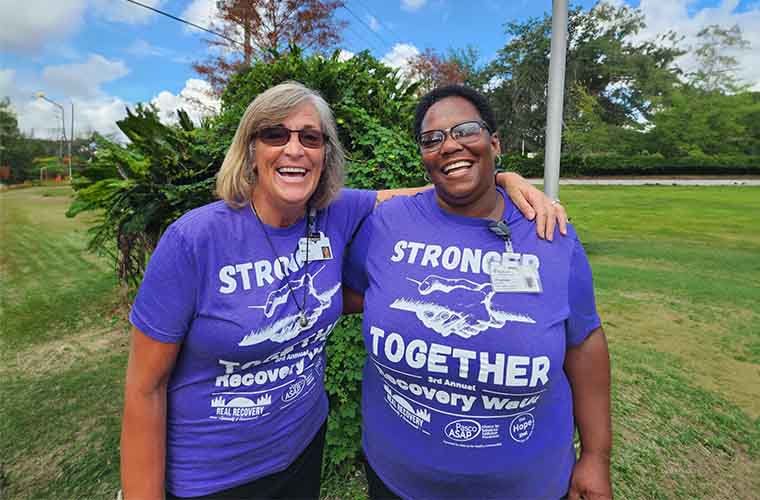BayCare Team Members Know Recovery Is Possible

BayCare Behavioral Health offers many services for individuals dealing with addictions. Peer recovery specialists — people in recovery who are trained and certified to help others achieve and maintain recovery from mental health and substance use issues — play a key role on the addiction team.
“Peer recovery specialists have shared many of the same challenges as our patients. They provide inspiration and a valuable perspective to the individuals they support in their recovery journey,” said Tracey Kaly, director, ambulatory clinical operations. “Peer recovery specialists are the secret sauce in our addiction treatment program.”
Wendy Dillingham is one of BayCare Behavioral Health’s peer recovery specialists.
Dillingham’s Story
Two decades ago, Dillingham couldn’t have imagined that role for herself, nor would anyone else who knew her then.
She used illegal substances from the time she ran away at 15 until she was 40. She spent most of her adult life in jails and prisons, and in 2006, she was sentenced to two years in prison and two years of house arrest.
“There’s not much to do in prison, but the last time I went I was ready to change,” Dillingham said. “I took advantage of all the classes offered. I went to everything from Alcoholics Anonymous to Narcotics Anonymous to Bible studies just to stay busy,” she said.
Dillingham didn’t just attend classes. She listened and participated. Her last time in prison changed her life. She left prison no longer addicted to drugs, but she was homeless and jobless. She went to a halfway house and at 40 started working at a Chick-fil-A.
Dillingham proved to herself she could hold a job and save money, but she had other goals. In 2012, she went back to school and earned her bachelor’s degree. She also became certified as a peer recovery specialist.
Seven years ago, BayCare hired her as the senior case manager at BayCare Behavioral Health’s Adult Treatment Center. “I am devoted to BayCare, because the company waited six months for me to clear up my records, so I could be hired,” Dillingham said.
In her dual role with BayCare, Dillingham helps people who desperately want to begin their recovery journey. Four years ago, she met Cherrice Peters-Tanksley, who was ready to begin that life-changing journey.
Peters-Tanksley’s Journey
Peters-Tanksley began using illegal substances when she was just 11. The addiction cost her a lot, including the ability to hold a job and have a steady income. She was often homeless. She married and had four children, but she couldn’t parent them to the standard she would have liked. After battling with substance use for 30 years, she longed for things to be different.
“I wanted a new life,” she said. “I didn’t want to pass this down to my grandchildren.”
Little did she know her husband’s brief inpatient stay at Morton Plant North Bay Hospital would be the catalyst for her to receive lifesaving help, too.
After her husband was released from the hospital, Peters-Tanksley called the hospital’s care coordinator to talk about additional resources for him. The conversation quickly turned from her husband’s needs to Peters-Tanksley’s needs. Peters-Tanksley’s life was not what she wanted. She wanted to clean up her life and stop using drugs.
The care coordinator contacted Dillingham, who reached out and connected with Peters-Tanksley. Although she was reluctant at first, Dillingham told her she could have a bed at BayCare Behavioral Health’s Integrated Stabilization Unit (ISU) for detoxification that day.
The day Peters-Tanksley met Dillingham at the ISU her life changed. “I didn’t look back,” she said.
When she was ready to leave the ISU, Dillingham and BayCare helped Peters-Tanksley move to a sober living house.
“When you have been using drugs for a lifetime, what may seem like normal adult skills aren’t normal. You don’t know how to manage money. You don’t have job skills. The programs helped me with all of this,” Peters-Tanksley said.
A stable home gave her the opportunity to go to school to become a patient care technician.
When Peters-Tanksley’s time at the sober living house ended, she moved to Metropolitan Ministries, where she could also work to pay her rent and establish a bank account.
On Valentine’s Day in 2022, BayCare hired Peters-Tanksley as a mental health technician at the Community Recovery Center (CRC). In just a year, she advanced from a mental health technician I to a mental health technician III. BayCare also paid for her to receive her SMART Recovery Certification, so she can facilitate groups at CRC.
“I have a job that I love, and I get paid for it,” Peters-Tanksley said. “I am preparing to be a certified peer recovery specialist, so I can help others move from where I was – barely surviving – to a fulfilling life.”
Peters-Tanksley and Dillingham agree that peer recovery specialists connect with clients because they understand what the client is going through and bring a deeper empathy level to the table. That lived experience may make all the difference to give another person struggling in addiction hope. Both are members of the Peer Support Coalition of Florida to continue to advance peer support programs in the state.
“It is mentally tough to go through a rehabilitation program, but I want people to know it is worth it,” Peters-Tanksley said.
For more information on BayCare Behavioral Health’s substance use services, visit BayCare Behavioral Health Substance Use Services.
